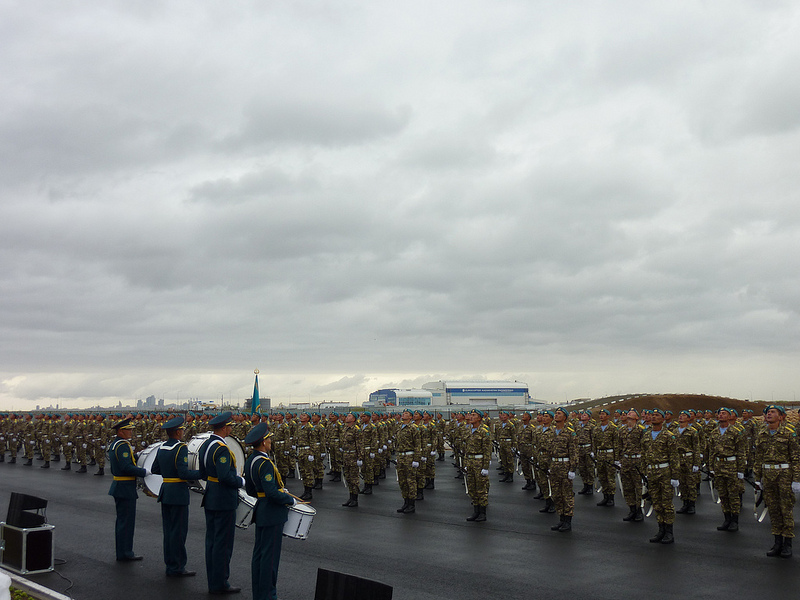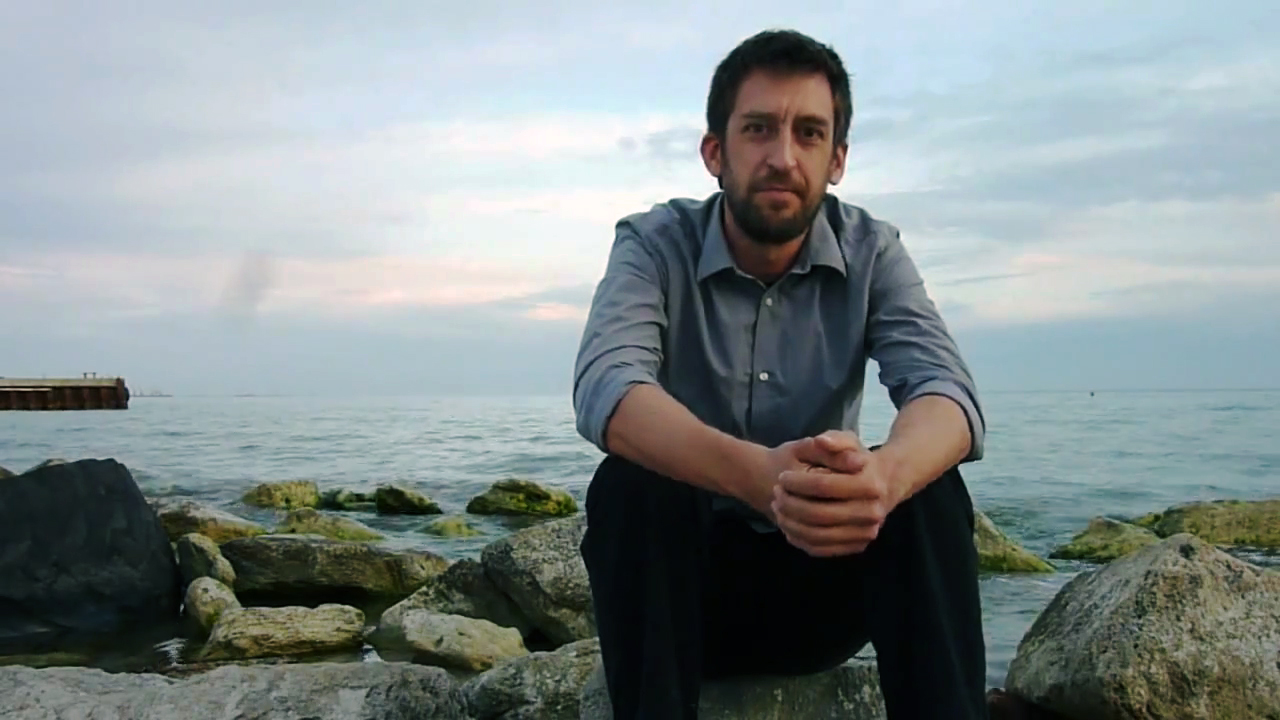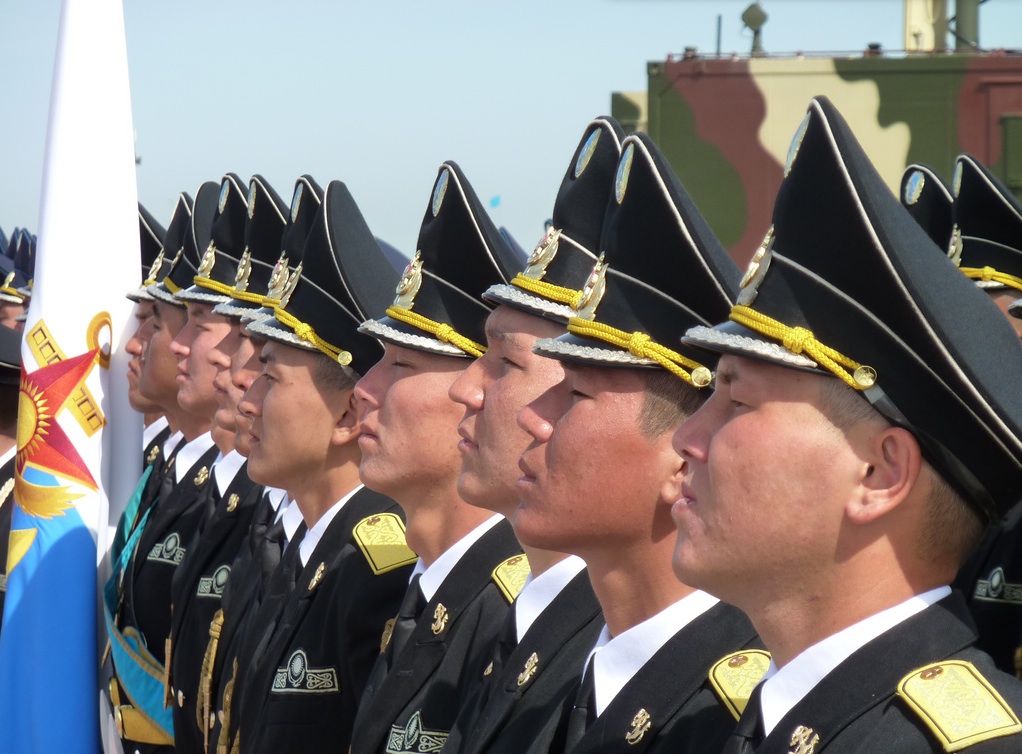
A remote Kazakh airfield, surrounded by frigid, windblown steppe, would seem an unlikely place for the world's largest defense contractors to gather. But the country's ambitious president, Nursultan Nazarbayev, has decided he wants to build a world-class armaments industry in Kazakhstan. And that the industry's big global players have come here, to the country's second biennial defense expo, suggests that they're taking him seriously.
Major foreign companies are not a new phenomenon in Kazakhstan: Shell, Chevron, and ExxonMobil have helped Kazakhs exploit the country's rich oil and natural gas reserves in the Caspian Sea, fueling Kazakhstan's impressive growth since it gained independence after the collapse of the Soviet Union. But companies like Airbus, Elbit and General Dynamics are newer on the scene.
Like all post-Soviet countries, Kazakhstan's military is armed primarily with Russian and Soviet equipment. But it's trying to diversify its sources for armaments, part of a broad foreign policy that Nazarbayev calls "multivector diplomacy," or balancing relations with various powers so as to not be too dependent on one. And the defense expo, KADEX, is an attempt to stimulate business with new partners. While Russian companies are still the dominant foreign exhibitors at KADEX, they're not the only game in town.
There are so many Turkish companies that they have their own pavilion, and Israel is also well represented. French company MBDA is exhibiting its Exocet missiles, Airbus its C-295 military transport planes and General Dynamics its armored personnel carriers. "We are not buying only from Moscow, we are buying the best," Talgat Zhanzhumenov, Kazakhstan's deputy defense minister, tells me.
And Kazakhstan has ambitions to not only buy weapons, but to sell them as well. Kazakhstan also wants to diversify its economy, so that it's not too dependent on oil and gas. And the armaments industry is one of the sectors it has chosen to promote. It has a defense industry left over from the Soviet period, but it is small and its products far from cutting-edge. So Kazakhstan is enticing foreign companies to set up joint ventures with local firms, building factories in Kazakhstan and getting the foreign engineers to train local staff and to offer up their blueprints so that Kazakhs will eventually be able to build the armaments themselves.
It's not a setup the foreign companies relish – they make more money by simply selling equipment directly. But Kazakhstan's growing wealth has led to ambitious military modernization plans, and foreign firms see a potentially lucrative market. And it's a measure of Kazakhstan's clout that the companies are buying in. Next to the airfield where KADEX is being held, a brand new factory is rising up, painted with a sign reading "Eurocopter Kazakhstan Engineering." It's a joint venture between the European helicopter manufacturer and Kazakhstan's state-owned defense holding company. Once it opens in July–on Nazarbayev's birthday–the factory will produce EC 145 helicopters for Kazakhstan's military and other government agencies. And there is much more such cooperation: French firm Thales is making military communications equipment, Turkish company Aselsan night-vision devices and Spanish firm Indra radars – all in Kazakhstan.
And at this KADEX, a whole raft of new agreements was signed to set up more defense manufacturing in Kazakhstan: Cessna will build airplanes, South Korean shipbuilder STX will renovate Kazakhstan's shipyard and Ukrainian Ukroboronexport will build armored personnel carriers. In total, the deals signed by Kazakhstan Engineering at this KADEX are worth $1.8 billion, the company said.
But KADEX isn't only about business, it's also a chance for the government to show off its growing might to its citizens. The final two days of the expo were open to the public, and Kazakhstan's middle class swarmed the airfield, admiring the high-tech foreign gear and posing for photos next to their country's tanks and helicopters. Fighter jets did aerobatics and Kazakh paratroopers showed off their maneuvers. There was even a "military band festival," featuring marching bands from the German, Indian and U.S. military. But it was the Kazakhstan military band that stole the show with this Kazakh-Swedish joint venture:
If you do not see the video please watch it here.

Education Resource
Joshua Kucera: Military Build-Up in the Caspian
The Caspian Sea once knew Russia as the sole dominant power with substantial naval might. Now there...



